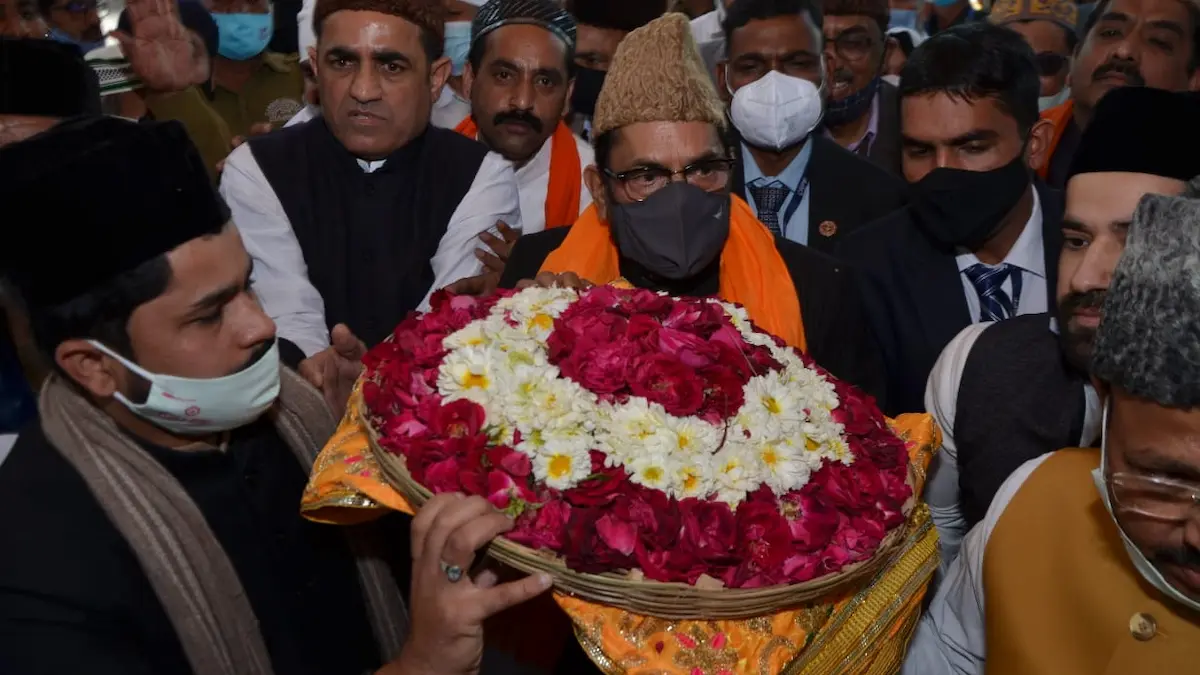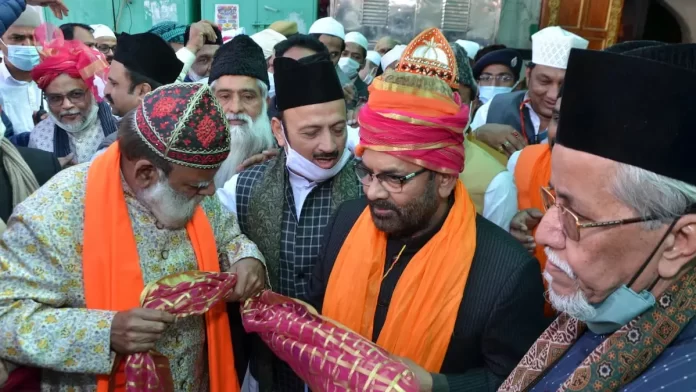On the occasion of 810th Urs of Khwaja Moinuddin Chishti, Union Minister Mukhtar Abbas Naqvi on Sunday offered a Chadar on behalf of Prime Minister Narendra Modi at Ajmer Sharif Dargah in Rajasthan.
PM Modi in his message conveyed greetings and best wishes to followers of Khwaja Moinuddin Chishti in India and abroad on the occasion of the annual Urs.
He said that the philosophy and principles of Garib Nawaz will continue to inspire the generations to come.
“I pay homage to the Great Sufi Saint, who gave the message of humanity to the entire world. Unity in Diversity is the identity of India. Harmonious co-existence of various sects, communities and beliefs in the country is our strength”, the Prime Minister added.
Who was Khwaja Moinuddin Chishti?
Fondly referred to as Garib Nawaz, Khwaja Moinuddin Chishti was an Indo-Persian Islamic preacher, mystic, scholar, and philosopher who promulgated the famous Chishtiyya order of Sufism.
He was born in Sistan (Iran-Afghanistan) in the mid-12th century into a farmer’s family that descended from Prophet Muhammad, peace be upon him.
After completing his studies from the eminent seminaries of Bukhara and Samarqand, he turned towards spiritual mysticism and dedicated his life to spreading the Islamic teachings in unique manners.
When did Khwaja Garib Nawaz come to India?
Khwaja Garib Nawaz came to India and settled in Ajmer in 1192, shortly after the victory of Shihabuddin Muhammad Ghori over Prithviraj Chauhan in the second battle of Tarain.
He is remembered for his great contribution to the propagation of Islam in India.
According to historians, his charismatic persona coupled with his tolerant and compassionate behavior was a driving force behind the mass conversion of local Indians to Islam at his hand.
Khwaja made Islam more relatable to Indians
Khwaja Moinuddin Chishti was also one of the first major Islamic mystics to use music in matters of devotion to God.
He apparently did so in order to make Islam more relatable to the Indians who had recently entered its fold.
His outlook was so broad and humane that some of his verses are later found quoted in the Adi-Granth of the Sikhs, writes Satish Chandra in the history of Medieval India.
The Chishti saints unlike the Suhrawardis preferred to keep themselves aloof from state politics and shunned the company of rulers and nobles.
Pir Fakirs have strengthened India’s Social Fabric
PM Modi in his message said that the great Saints, Mahatmas, Pir, Fakirs have played a pivotal role in strengthening the socio-cultural fabric of the country in different periods.
“In this glorious tradition, the name of Khwaja Moinuddin Chishti, who gave the message of love and harmony to the society, is taken with full respect and reverence”, he said further.
PM prayed for country’s happiness and prosperity
Noting that the Urs is the symbol of harmony and brotherhood, the PM said that it will further strengthen the faith of the devotees.
“With this belief, on the occasion of annual Urs of Khwaja Moinuddin Chishti at Dargah Ajmer Sharif, I pray for the country’s happiness and prosperity” the PM said.
Union Minister Mukhtar Abbas Naqvi stated that the life of Gharib Nawaz inspires us to strengthen the commitment to communal and social harmony.
This unity can defeat the forces, who are engaged in the conspiracy to create divide and conflict in the society.
“The teachings of Khwaja Moinuddin Chishti is the effective message of peace across the world and India’s culture and commitment”, he added.

